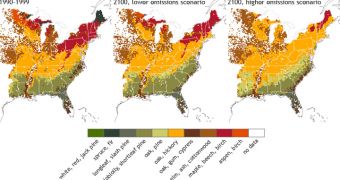It's no secret that global warming has a great influence upon the environment. First, scientists found out that increased temperatures are responsible for the fact that small creatures and plants are shrinking. Now, researchers discovered that climate change might imply another effect, making the species of trees migrate, in search of appropriate temperatures.
Forests as we know them will most likely disappear. Nowadays, experts from the USDA Forest Service has identified ten forest types, but they warn us that things are about to change.
Not every specie of trees settles for the same characteristics. Their growth in certain areas is influenced by different factors, such as soil characteristics, land use, and also, climate factors which include the quantity of precipitation and temperature.
Scientists forecast that the maple, beech, and birch forests which are one of New England's characteristics will be replaced by oak/hickory-dominated forests. This phenomenon will have a major impact on the entire ecosystem, if we come to think about the fact that certain creatures won't be able to adapt themselves to the future conditions provided by their new habitat.
Researchers tried to highlight the connection between tree “migration” and the amount of CO2 emissions which will design our future, taking into account two different scenarios: one in which the carbon footprint will increase significantly, and another one which relies on lower (but still increased) level of CO2 in the atmosphere.
The effects of the first scenario are quite disturbing. It seems that experts warn that, if these forecasts are actually realistic, almost every tree in each forest we could think of will be represented by oaks and hickories, until 2100.
Scientists can't really predict the impact air quality will have upon forests, because they aren't able to predict the evolution of the CO2 emissions, since it depends mostly on the human factor and the legal framework which will be adopted in the future.
One things is certain. Scientists are preparing the public opinion for the worst-case scenario, and if things follow this path humankind can say goodbye to biodiversity.

 14 DAY TRIAL //
14 DAY TRIAL //